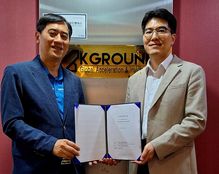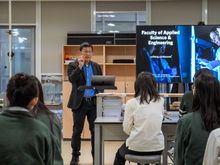
최신기사
HyperVisual AI Secures Investment from K-Ground Ventures Innovation IP Fund for On-Device AI Vision Intelligence
HyperVisual AI, a startup developing on-device vision intelligence solutions that apply AI technology directly on edge devices without relying on cloud connectivity, announced on June 2nd that it has secured investment from K-Ground Ventures, a leading VC in deep tech commercialization in Korea and the first operator of the Scale-up TIPS program. Founded in 2023, HyperVisual AI is a semiconductor-based AI startup that is developing a General-Purpose Neural Processing Unit (GPNPU)—an AI processor operable on-device—as well as proprietary AI models and frameworks. Their GPNPU architecture, a hybrid structure combining general-purpose GPU computing (GPGPU) and Neural Processing Units (NPU) into a single core, enables efficient low-power AI computation. This technology is considered highly optimized for on-device environments. The company was recently selected for the Ministry of SMEs and Startups' “1000+ Super Gap Startups” program, drawing significant interest from fabless firms, VCs, and investors. CEO Samyun Jung of HyperVisual AI stated that “We are pleased to have our patent value highly recognized and to have secured investment from the K-Ground Innovation IP Fund, which specializes in deep tech IP investments. HyperVisual AI is actively conducting joint development projects with client companies in the on-device AI industry, where convergent technologies are the key to competitiveness. With our outstanding R&D capabilities and Korea’s deep tech infrastructure, we aim to grow into a global hybrid vision intelligence total solution provider through collaboration with clients and investors.” Nam-Hoon Cho, CEO of K-Ground Ventures and a leading expert in deep tech technology commercialization, said, “We have long recognized the GPNPU hybrid architecture technology of HyperVisual AI as an innovative IP and technology that can lead the future on-device market. Based on mentorship and business support, we decided to proceed with the investment. The target markets for on-device applications—mobile, consumer electronics, mobility, and robotics—are areas where Korean companies are particularly strong. We believe that competitive Korean firms can lead the global market through convergent technology. Bold government policy support is needed to establish a new ecosystem that will lead the global on-device AI market, which is expected to become a next-generation growth engine.” K-Ground Ventures also announced that, through this investment, it plans to build an on-device semiconductor alliance in collaboration with organizations like the Fabless Industry Association, and actively work to discover, invest in, and foster innovative companies. According to a Deloitte report, the on-device AI market is expected to grow rapidly at an annual rate of 27.95%, reaching USD 16.7 billion by 2031. Attachment 1: Introduction to HyperVisual AI Technology The GPNPU architecture currently under development is designed so that the GPU and NPU share memory, with each handling parallel and matrix operations, respectively. This approach resolves bottlenecks, memory access delays, and complex pipeline issues common in traditional heterogeneous computing architectures (CPU, DSP, NPU), significantly improving power efficiency. Moreover, GPNPU is designed to support not only Vision Transformers but also multimodal and cross-modal AI architectures on edge devices, showing strong potential for future scalability. Based on this technological foundation, the company plans to complete GPNPU IP design by 2025 and begin commercializing its semiconductor IP in 2026. The ultimate goal is to secure technological leadership in the on-device AI market with a total vision intelligence solution that integrates their proprietary processor and models. 최지원 기자intelligence investment device vision ground ventures device environments
2025.06.01. 21:56

Branksome Hall Asia Explores the Future of Artificial Intelligence and Emerging Technologies – Dr. Yip's Series of Sessions
On January 8 and 9, 2025, Branksome Hall Asia hosted a series of sessions on the future of Artificial Intelligence (AI) and emerging technologies, inviting Dr. Chris Yip, Dean of the Faculty of Applied Science and Engineering at the University of Toronto, and his colleague, Professor Aimy Bazylak. The event took place at Branksome Hall Asia’s Jeju campus. The series of sessions, titled "Preparing for the Future Through Artificial Intelligence and Emerging Technologies," featured in-depth discussions, including a session for students on "Sustainable Energy" and "Careers in Engineering." During his presentation, Dean Yip discussed the profound impact of the rapidly evolving AI era on engineering education, highlighting real-world examples of the opportunities and potential these changes present. He emphasized the importance of interdisciplinary education and collaboration in fostering innovation and preparing students to become leaders in the field of technology. Following the sessions, attendees had the opportunity to engage in meaningful discussions with the professors, gaining valuable insights into future technologies and related career paths. Dean Chris Yip has served as the Dean of the Faculty of Applied Science and Engineering at the University of Toronto since 2019, focusing on developing engineering solutions to build sustainable communities and promote equity. He has led educational innovation by introducing unique programs related to public policy and equity, aiming to nurture the next generation of engineering leaders with diverse perspectives. As a researcher, he is internationally renowned for his contributions across various fields, including molecular imaging, neuroscience, nanotechnology, and biomaterials. Professor Aimy Bazylak, from the Department of Mechanical Engineering at the University of Toronto, conducts research in diverse technical areas such as clean energy, thermofluids, microfluidics, and fuel cell design. Branksome Hall Asia, the host of this event, is a full IB continuum school offering an innovative design technology curriculum across all grade levels. It goes beyond STEM education to include interdisciplinary fields such as business, design, and the arts. Through this approach, students participate in collaborative projects addressing global challenges including circular economies, energy efficiency, and sustainable design. These projects empower students to harness cutting-edge technologies while fostering creative problem-solving skills. Dr. Blair Lee, Head of Branksome Hall Asia, stated, "Branksome Hall Asia will continue to actively support students in becoming global leaders who are capable of addressing the complex challenges of the future through innovative educational programs." 박원중 기자 ([email protected])intelligence technologies emerging technologies future technologies hall asia
2025.01.08. 22:06
